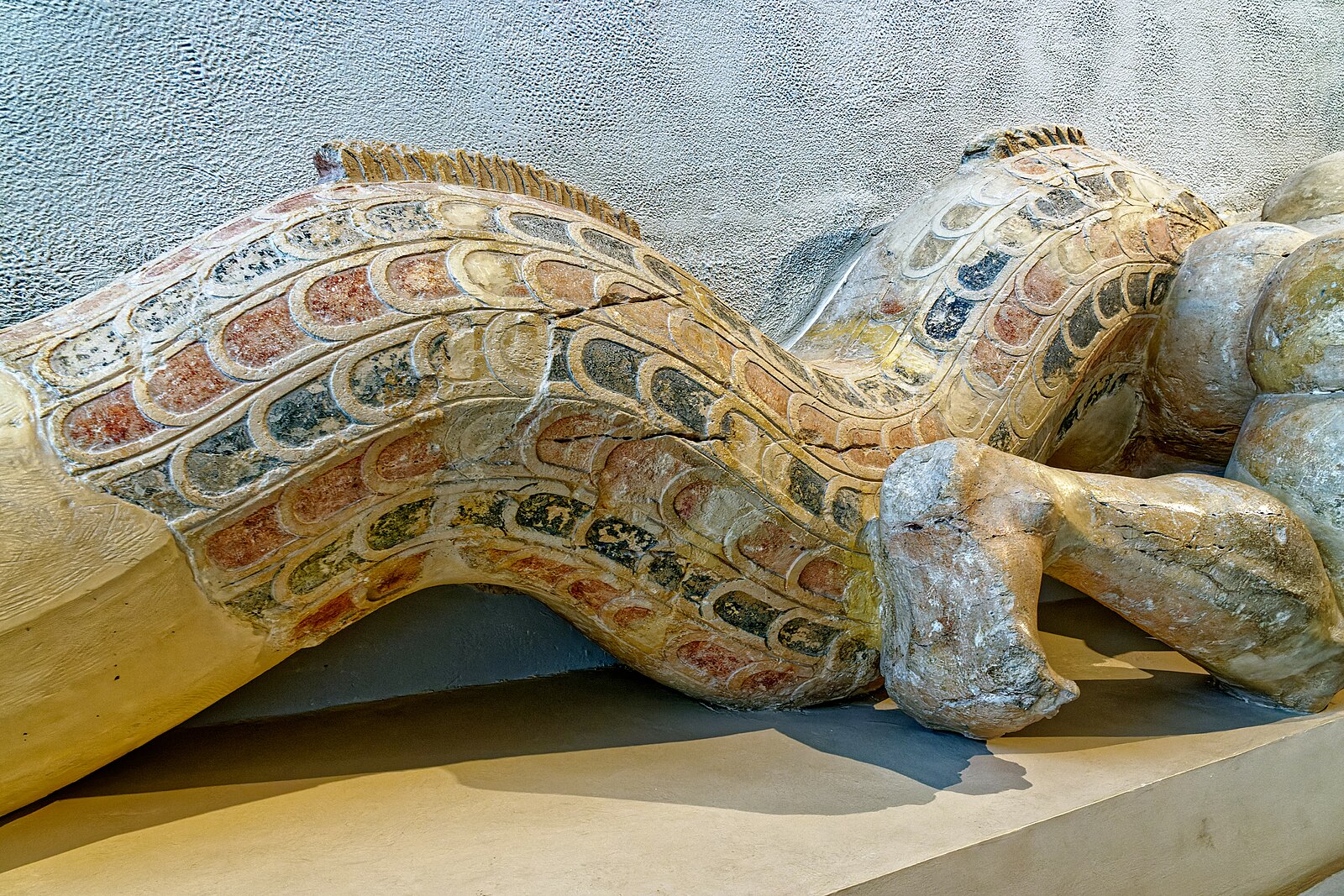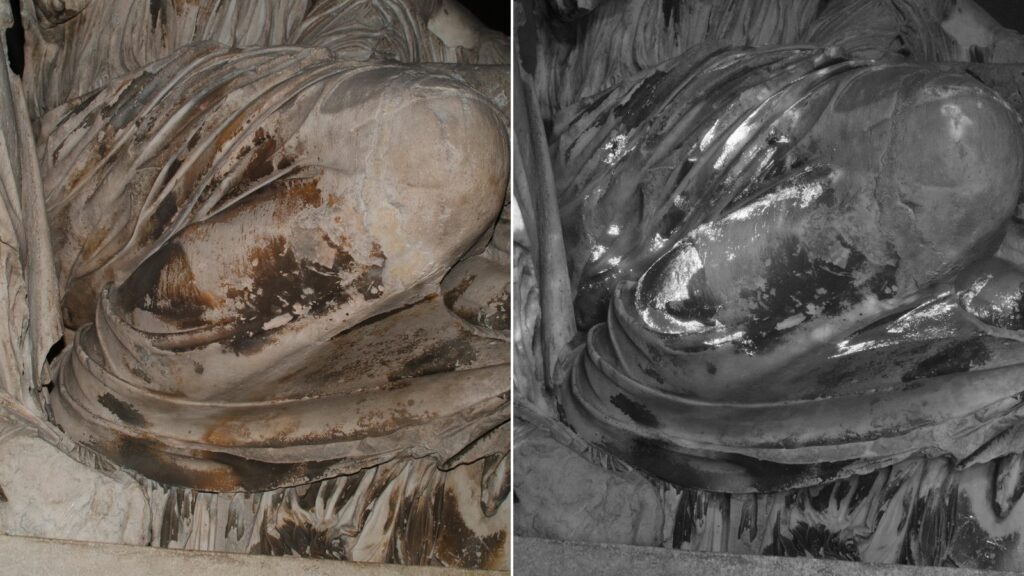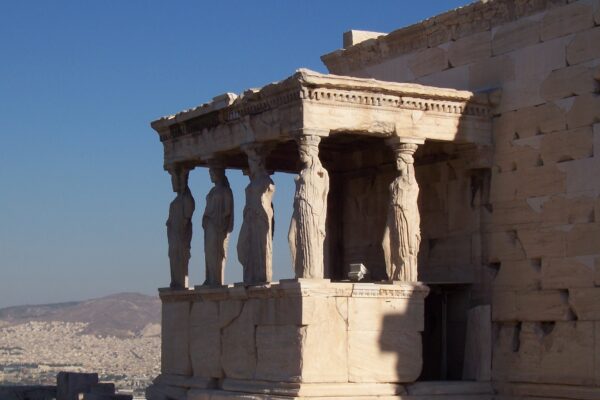
This is not what is meant by the term “Egyptian Blue,” but wouldn’t it be awesome if it was?
Episode 72: In which the mortals learn the Parthenon sculptures have blue paint, and the gods learn the mortals didn’t already know that.
This episode of Real Housewives of Mt. Olympus brought to you by the latest archaeological news on CNN.com and SmithsonianMagazine.com – and by CLAS-C 386 Greek History.
IRIS, GODDESS OF THE RAINBOW AND MESSENGER OF HERA (bursting in): Did you hear the latest news about the painting on ancient sculptures? They’ve discovered trace amounts of pigment on the sculptures from the Parthenon! Rainbows Represent!
HERMES, GOD OF LOWER-LEARNING AND MESSENGER OF ZEUS: Iris, once again, I have no idea what you’re talking about. You can’t just burst in here and yell something about paint and expect people to understand you, let alone care. Messenger much?
IRIS: We were just talking about this! Modern mortals think ancient sculpture was bare white marble. So scientists have to keep examining the sculpture and finding trace amounts of pigments to demonstrate that the marble once was painted.

”Gentlemen, I don’t want to alarm you, but…I *think* there might be some paint on our white sculpture.”
ATHENA, GODDESS OF WISDOM AND CRAFTSMANSHIP: I vaguely recall being furious about this. Mortals think ancient sculptors took great pains to make marble look like textured skin and drapery, and then threw down their chisels and declared, “Well, there is no way to continue this lifelike rendering, I’ll have to settle with blinding white. Curse my inability to put paint on pots but not on stone!”
HERMES: Oh I know about the problem. I just don’t care when Iris talks.
IRIS: The mortals used all sorts of colors this time. They shone ultraviolet light on the statues, and the remaining paint absorbed the light’s red spectrum, and glowed white, and that’s how they recognize the pigment Egyptian Blue!
HERMES: That sounds like you huffed a bunch of sniff-and-smell markers. I loved those. Mortals gave their children sticks laced with brain killing chemicals and instructed them to inhale. Mortals are the best.
IRIS: Did you hear it involves a spectrum of light? Like a rainbow! That’s absolutely my domain, even if you think Persephone is the goddess of color just because she likes flowers.
ATHENA: Why is the pigment so hard to see in the first place? What happened to all the paint?

When archaeologists go to raves.
PERSEPHONE, GODDESS OF THE UNDERWORLD AND POSSIBLY COLOR: The mortals in the museum that holds the marbles used iron tools to scrub the paint off a century or so ago.
HERMES (jumping): Crikey! Persephone, I don’t care if you underworld gods get summoned anytime someone says your name, you have to figure out a way to warn people.
ATHENA: Why would they scrub the paint off? Were they defacing my statues?!?!
PERSEPHONE (shrugging): Maybe they were just trying to clean them. Dickensian London had air pollution like you wouldn’t believe. Or maybe they were subject to chauvinistic tendencies to value whiteness. Hard to tell, but gross either way. We get a lot of shades in the Underworld from both.
IRIS: See, this is why mortals should value rainbows more.
ATHENA: Also, didn’t you say these sculptures were from the Parthenon? That’s my main temple! In Athens! What are the sculptures doing in London?

The British Museum curators were disappointed to find that the Elgin Marbles had photobombed their group portrait.
PERSEPHONE: Long story, but I think the British took them from the Ottomans, who took Greece from the Byzantines.
HERMES: Now you sound like you’ve been huffing markers. I was not aware that Greece continued after the Roman Empire. Weird.
PERSEPHONE: I mean, Greece is a modern nation state today. You do know that, don’t you? You have to know that.
HERMES: Yeah right. If that’s the case, why haven’t the British given the sculptures back to Greece?
PERSEPHONE: Lots of reasons. But one of them is that they claimed that the Greek government couldn’t take care of the sculptures.
IRIS: The sculptures that the British museum people scrubbed the ancient paint off of?
ATHENA (putting on helmet, reaching for her spear): That’s it. I’m clearly the best person to decide what happens to these statues. My temple in Tennessee at least has a polychrome cult statue for me. Let’s go get the Greek marbles from the British and move them to Tennessee.
Share on Instagram, or really wherever you want.
To explore what happened to Greece after they built the Parthenon (hint: they didn’t take their ball and go home), enroll in CLAS-C 386 Greek History, coming up Spring 2024, no pre-reqs or previous experience required. Or for more exploits of the Greek gods, and how their myths shaped Ancient Greek and modern societies, enroll in CLAS-C 205 Classical Mythology, coming up Spring 2024 and Summer 2024, and earn GEC credits while you’re at it! While you’re waiting, make sure to check back for more adventures of Athena, Hermes, and Persephone. Can’t get enough of Ancient Greece and Rome? Earn a Classics Minor in just 15 credits!


